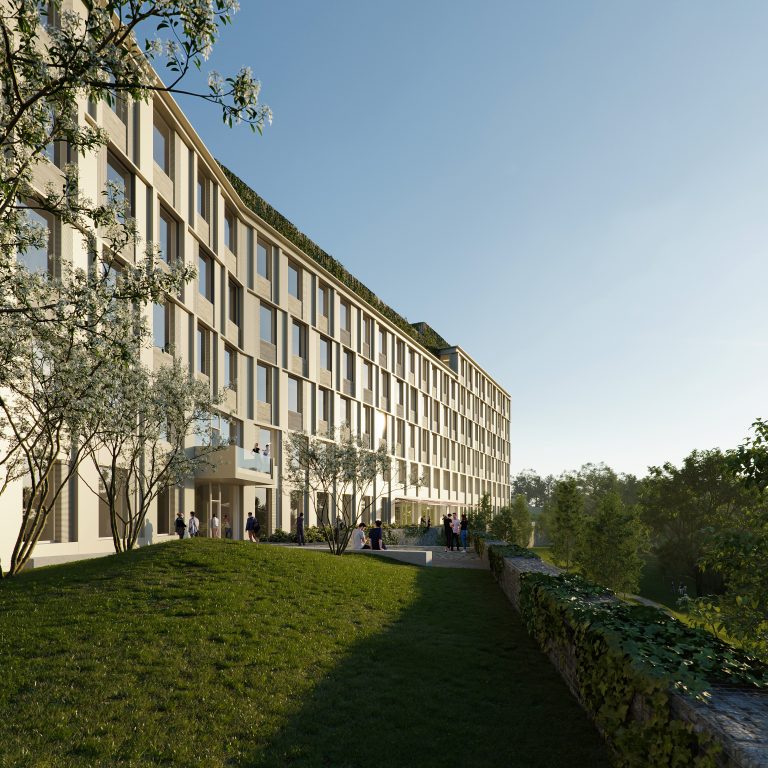The future MUNI BioPharma Hub will become a new hub for educational and research activities. Photo credit: MUNI.
Brno, June 2 (BD) – The university campus in Brno–Bohunice will be expanded with a state-of-the-art educational and research facility. The Faculty of Pharmacy of Masaryk University (MUNI) recently received a building permit for the construction of the BioPharma Hub project. Immediately afterwards, a public tender for a general contractor of the construction was also announced.
The MUNI BioPharma Hub project is a combination of the modern teaching spaces of the Faculty of Pharmacy and the top research infrastructure of the Preclinical Center and the Center of Molecular Medicine. The building will also provide a background for scientific education in the field of pharmacological and biomedical research and will contribute to the prevention, diagnosis and treatment of chronic diseases. Construction of the MUNI BioPharma Hub is scheduled to start in August this year.
“Shortly after starting my first term as rector, I returned the Faculty of Pharmacy back under the wings of Masaryk University after 60 years,” says Rector Martin Bareš. “Even then, the vision of the MUNI BioPharma Hub was in my head. High-end pharmaceuticals is one of the most demanding industries in terms of excellence and finances, but it has a major impact on our entire population. We saw it with covid, we see it even now, when discussions are opening about the drug insufficiency of the Czech Republic and the need for coordinated cooperation in this area at the EU level. In addition, the MUNI Biopharma Hub will also have an impact on humanities-oriented faculties, for example in the area of ethics in research or matters of pharmacoeconomics, which are being developed at the MU Faculty of Economics and Administration.”
The six floors and 13,500 m2 of the future MUNI BioPharma Hub will become a new hub for educational and research activities. In this way, the Faculty of Pharmacy will come closer to the Faculty of Medicine and Natural Sciences and the CEITEC research centre, providing space for inter-faculty cooperation, sharing of research knowledge and technological equipment.
In the underground spaces of the new building, laboratories will be built, which will enable the process of good manufacturing practice in the field of pharmaceutical forms. This will enable the faculty to produce smaller certified batches of drugs for cooperating pharmaceutical companies or other partners. In this way, students will gain experience with the real production of medicines during their studies.
“Currently, such an opportunity to produce small batches of drugs is missing in the Czech Republic and in the wider area, and Masaryk University wants to contribute as much as possible from the position of a top educational and research organisation. We believe that this could ultimately lead to more intensive drug development, which could contribute to the drug self-sufficiency of the Czech Republic and other EU countries,” said David Vetchý, dean of the MUNI Faculty of Pharmaceuticals.
Thanks to the new premises, the faculty will be able to accept a larger number of students and to offer new study programs responding to the current situation on the labour market.
If everything goes as planned, the MUNI BioPharma Hub should come into operation in the middle of 2026. The project documentation is currently under preparation, with emphasis on sustainability, as one of the goals of Masaryk University is to create an energy-efficient facility.
“Efficient management of resources is one of the components of Masaryk University’s Strategic Plan,” explains David Póč, director of the MU 2021+ strategic development project. “That is why the building’s energy management includes skylights that let in as much daylight as possible, and the production of its own electricity through photovoltaic panels or by reusing heat from the data centre.”
The MUNI BioPharma Hub will also use the heat from 53 geothermal wells under the building, and there will also be an accumulation tank holding rainwater used for flushing or further irrigation. There will also be climbing vegetation on the roofs, which adjusts the climate in the heated roof surfaces.







